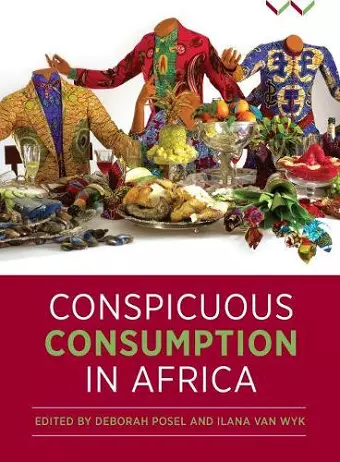Conspicuous Consumption in Africa
Pamila Gupta author Ilana van Wyk author Deborah Posel author Joni Brenner author Sophie Chevalier author Claudia Gastrow author Ilana van Wyk editor Deborah Posel editor
Format:Paperback
Publisher:Wits University Press
Published:30th May '19
Currently unavailable, and unfortunately no date known when it will be back

From early department stores in Cape Town to gendered histories of sartorial success in urban Togo, contestations over expense accounts at an apartheid state enterprise, elite wealth and political corruption in Angola and Zambia, the role of popular religion in the political intransigence of Jacob Zuma, funerals of big men in Cameroon, youth cultures of consumption in Niger and South Africa, queer consumption in Cape Town, middle-class food consumption in Durban and the consumption of luxury handcrafted beads, this collection of essays explores the ways in which conspicuous consumption is foregrounded in various African contexts and historical moments.
In 1899, Thorstein Veblen coined the phrase ‘conspicuous consumption’ to describe status-seeking in the obscenely unequal world of late-nineteenth century America. Many of the aspects he described in The Theory of the Leisure Class are still evident in our world today. While Veblen’s crude denunciation of material extravagance finds echoes in media exposés about the lifestyles of the rich worldwide, it is particularly recognisable in reporting on Africa. Here, images of conspicuous consumption have long circulated in local and global media as indictments of political corruption and signs of moral depravity.
The essays in Conspicuous Consumption in Africa put Veblen’s concept under robust critical scrutiny, drawing on theorists like Mbembe, Guyer and Bayart by way of critique or addition. They delve into the pleasures, stresses and challenges of consuming in its religious, generational, gendered and racialised aspects, revealing conspicuous consumption as a layered set of practices, textures and relations. The authors resist the trap of easy moralisation, pointing to more complex ethical and political registers of analysis and judgement. This volume shows how central and revealing conspicuous consumption can be to fathoming the history of Africa’s projects of modernity, and their global lineages and legacies. In its grounded, up-close case studies, it is likely to feed into current public debates on the nature and future of African societies – South African society in particular.
This fascinating, nuanced and persuasive volume combines sophisticated theoretical expositions with a high level of empirical inquiry. Taken together, the essays provide an important entry into the study of consumption in Africa, and indeed make a serious intervention into current socio-political concerns. — Robert Ross, Professor of African History Emeritus, Leiden University, the Netherlands. This volume offers a summary of the relevance of consumption as a terrain of meaningmaking to South African public debates. It will convince readers that much more is going on with consuming practices than the media sometimes solicits. In particular, it brings attention to an abiding tension in discussions around `consumption’: normative expectations of societal values entailed in such phenomenon as `conspicuous consumption’ are set against the symbolic practices illustrated through the performative, visual presentation of status (and claims and counterclaims to it). — Bridget Kenny, Associate Professor of Sociology, University of the Witwatersrand, Johannesburg
ISBN: 9781776143641
Dimensions: unknown
Weight: unknown
256 pages